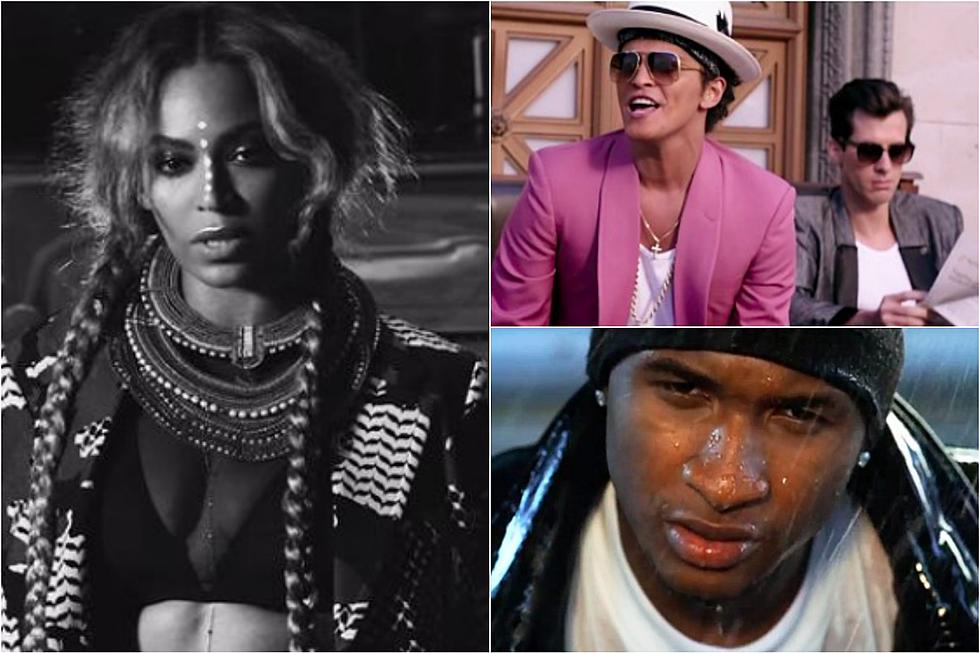
UGK Continue Their Reign as Underground Kingz: August 7 in Hip-Hop History
August 7 has been a great day for album releases! Let’s revisit the soloists, duos and groups who have helped make today a fertile day in hip-hop history with debuts, comebacks and earthly farewells.
August 7, 2001: Usher Releases 8701
Usher Raymond’s third album (and first for Arista) 8701 emerged four years after My Way, his last effort for LaFace Records, and has been certified 4x Platinum (as compared with My Way's 8x Platinum). “U Got It Bad,” and the Grammy-winning “U Remind Me” both went No. 1, while “U Don’t Have to Call” won the second Grammy for the album.
“Since I’ve been away from music for so long, this is really a step for me to regain or re-position myself as an entertainer once again,” he told Rolling Stone in 2001. “Last time, I was just a singer who got a lot of great opportunities in acting. Now, it’s really my chance to show that this is my direction in life, or in terms of what I plan on doing with my life for the next five or ten years.”
August 7, 2001: Jadakiss Drops Kiss the Game Goodbye
Jadakiss released Kiss the Game Goodbye, his first solo foray outside of The LOX, and was rewarded with a No. 5 debut on the Billboard 200, a No. 2 R&B/Hip-Hop hit and a Gold certification. The album, which featured guest appearances from his Lox groupmates, Styles P. and Sheek Louch, as well as heavyweights like Snoop Dogg, Pharrell Williams, Nas, DJ Premier and Just Blaze, notoriously lit up the beef with Philly rapper Beanie Sigel on “Uh-Hunh!” featuring DMX.
August 7, 2001: The Isley Brothers and Ronald Isley Prove They're Eternal
The 40th album from the Isley Brothers, Eternal went double Platinum, reached No. 3 on the Billboard 200 and No. 1 on the R&B chart, thanks to brother Ronald Isley’s hip-hop alter ego, Mr. Biggs.
"The hip-hop players in the business kind of look up to me because of my longevity in the industry," Ronald Isley explained to Washington Post in 2001. "When I'd come around, it was 'You the man, you this, you that.' Mr. Biggs was sort of the unspoken title that was given to me, so we just put it on a record."
Veteran writers and producers on Eternal included Raphael Saadiq, R. Kelly, Angela Winbush, Steve Huff, Andre Harris & Vidal Davis and Jimmy Jam & Terry Lewis.
"There are a lot of young people who relate to my brother as Mr. Biggs and they're really not aware of 'Shout' or 'Twist and Shout' or 'It's Your Thing,' and all of the history that's involved in the Isley Brothers, and the musical changes that we participated in and thrived on, so that virtually everybody has copied or sampled our stuff and been very successful with it,” Ernie Isley told the publication. “But all they know is Mr. Biggs because that's when they came on board."
August 7, 2001: Philly’s Most Wanted Drop Get Down or Lay Down
The debut album by Philly’s Most Wanted (Boo-Bonic and Mr. Man), Get Down or Lay Down featured guest appearances by Clipse, Beanie Sigel, Fabolous and Pharrell Williams of the Neptunes, who produced the bulk of the album. The Neptunes-helmed “Cross the Border” was the album’s biggest calling card, cracking the Billboard Hot 100 and ascending to a No. 3 rap hit. The album itself reached No. 69 on the Billboard 200.
August 7, 2007: UGK Continue Their Reign as the Underground Kingz
UGK’s Bun B. and Pimp C. enjoyed a No. 1 Billboard 200 debut for their fifth album Underground Kingz. Released just four months before Pimp C’s untimely passing in December 2007, the album features the calling card “Intl’ Players’ Anthem (I Choose You),” an epic duet with Outkast.
“It's crazy man, it's not your typical rap album,” Bun B. told Dubcnn in 2007. “There's a lot of stuff we touch on, what's going on in the streets, and we touch on what SHOULD be going on in the streets. We talk about our early years and how used to get into it, how we're trying to stabilize that money, we talk about different aspects of religion, about how it's like being a G in the streets getting out in the streets and still having faith in God, and that God will always look out for you even though you're doing wrong out there. We talk about those kind of things because that's what cats in the streets is really going through. They're trying to survive, they're trying to do the best they can, but everything they're doing ain't right! So how do you stay right with God? We talk about how the government is forgetting about people, and even some of our people are forgetting about people, and if we don't try to look out for ourselves then at this point nobody is going to look out for us, you know?”
August 7, 2007: Plies Gives The Real Testament of the Streets
The first album from Florida rapper Plies, who followed his incarcerated brother into the music business, debuted at No. 2 on the Billboard 200 and went Gold thanks to singles like “Shawty” featuring T-Pain and “Hypnotized” with Akon. But The Real Testament wasn’t what he originally wanted to call his album.
“Actually, that’s the backup name we had at first,” Plies told BallerStatus in 2007. “The name of my album was gonna be titled The Real N**** Bible, but retail kinda f***ed us up with that. Everybody didn’t wanna be a part of that situation for various reasons, but I feel like The Real Testament, August 7, that’s my day to bring the world into the mind of Plies. For me, I think some of the sh** that I’m talking about on my album, it’s not ‘real’ music, but it’s ‘reality’ music. That’s has separated me up until this point since I been doing this music sh**.”
August 7, 2007: Public Enemy Ask How You Sell Soul to a Soulless People Who Sold Their Soul?
The tenth studio album by Public Enemy was released on frontman Chuck D’s Slam Jamz label to mark the 20th anniversary of the influential group.
“I think soul isn’t just something you hear, it’s something you feel,” he explained to Westword in 2007. “And it’s something that can harken back to your original feelings about how you want to think about life and music. For example, the answer to the album’s question, how can you sell soul to a soulless people who sold their soul – the answer is that you don’t. My thing is, I have a firm belief that we have to give soul away in order for people to recognize it. Like a taster test. You don’t sell soul. You give it away, and then they’ll recognize soul.”
More From TheBoombox








![20 Rappers Starring In Fun Commercials [VIDEO]](http://townsquare.media/site/625/files/2018/08/Rappers-and-Commericals.jpg?w=980&q=75)
